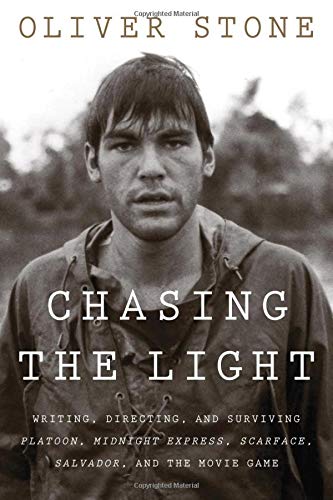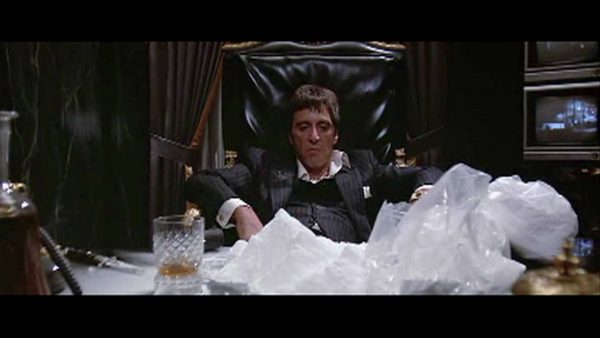Book Review: “Chasing the Light” — The Agitated Life of Oliver Stone
By David Stewart
Filmmaker Oliver Stone’s memoir is an exhilarating primer for anyone who wants to understand his reputation as a writer and director.
Chasing the Light: Writing, Directing, and Surviving Platoon, Midnight Express, Scarface, Salvador, and the Movie Game, by Oliver Stone. Houghton Mifflin Harcourt, 352 pages, $28.

When the name Oliver Stone comes up in conversation, a myriad of descriptions come to mind: provocateur, conspiracy theorist, or “The most dangerous man in America” as The Los Angeles Times dubbed him. For the 73-year-old’s newly published memoir, Chasing the Light, Stone goes back to his original calling as a writer: and a damn brilliant one at that! If you are expecting a jaw-dropping look at the making of JFK or Natural Born Killers, this is not that book. (Jane Hamsher published the infamous Killer Instinct in 1997.) In Chasing the Light, Stone examines one of the most perplexing and conflicting people he knows — himself. I remember seeing Stone in 2013 in Washington DC talking to a packed audience of fellow academics about his then-newly released Showtime series with Peter Kuznick, The Untold History of the United States. I couldn’t help notice Stone’s pensiveness and agitation when being asked about current events, the NSA, or the political climate before Trump. It was almost as if he were anxious to get beyond the headlines in the Washington Post — he was searching for something deeper.
Born and raised by an Eisenhower-conservative stockbroker of a father and a French mother who savored the nightlife more than being a Stepford Wife, Stone views the fractured relationship between his parents through his solemn, yet traumatized eyes. He revisits a pivotal moment at his private school, where his father tells him that the couple will be divorcing. His anger and confusion lead him to rebel against his father’s wishes that he graduate from Yale. Stone goes to Vietnam as an English teacher in 1965. He drops out of Yale a second time; he is lugging around a manuscript, fantasizing he will be the next Norman Mailer. Stone returns to Vietnam in 1967 as an infantryman and serves two tours of duty. When Stone addresses why he went to Vietnam, he cites that depression was the impetus behind his decision to fight. However, it was his experiences as a soldier that would shape his destiny, inspiring him to write and direct Platoon, which he would seek to make for the next 20 years.
Stone’s book is an exhilarating primer for anyone who wants to understand his reputation as a writer and director. His exploits as a grunt, discovering drugs and psychedelic rock with his brothers in arms, and landing in a prison cell in San Diego for marijuana possession would be the template experiences for Platoon, The Doors, and his first Oscar-winning screenplay, Midnight Express. Returning to the grime of ’70s New York City as a taxi driver and student on the GI Bill, Stone found his salvation at the feet of Martin Scorsese, a teacher and aspiring filmmaker at NYU. Scorsese was the first person to call Stone a filmmaker after watching his short film, My Last Year in Vietnam. Despite the accolades, Stone would spend the mid-’70s learning from his early failures and mistakes as he directed forgettable B-movie fare like Seizure before his name became synonymous with Hollywood.
As the book shifts from New York to Los Angeles, so does Stone’s taste for drugs. He recounts when he gave his first middle finger to Hollywood: when he accepted his first Golden Globe (for writing Midnight Express) high on cocaine and Quaaludes. He was jeered off the stage when he attempted to address the flaws in the War on Drugs. He was dragged off by Chevy Chase and Richard Harris. Stone is honest about his collaborators and adversaries: there are his fond memories of befriending Richard Boyle and Ron Kovic, the subjects of his films Salvador and Born on the Fourth of July, respectively, and recalling his awkward relationship with the late Alan Parker during the making of Midnight Express. Stone’s trademark impish grin is omnipresent throughout his remembrances. Stone admits he was no saint in L.A. regarding drugs and his behavior with women. He wrote Scarface as an exercise in his attempt to kick cocaine; there’s a white-knuckle chapter about how Stone’s life inspired Tony Montana’s death-defying drug deal in the first half of Brian De Palma’s film.

Al Pacino ponders heaps of cocaine in Scarface.
Although Chasing the Light focuses on Stone’s career up until Platoon swept the Oscars in 1987, he doesn’t hold back on his critical analysis of Hollywood since the late ’80s. Stone blames Harvey Weinstein’s pugilistic campaigning efforts during Oscar season for transforming the awards into an over-hyped sporting event. This carnage was accomplished before 2017 rape and sexual assault allegations reduced the Miramax founder to a pariah. Additionally, Stone talks about his disdain that many now see movies played on 100-inch, High-Def smart TVs at 30 frames per second as opposed to the traditional 24 frames. This is a lament shared by other directors, such as Christopher Nolan and Paul Thomas Anderson.
At the 2006 Cannes Film Festival commemorating the 20th anniversary of Platoon, Tom Berenger compared Oliver Stone to Ernest Hemingway. Fourteen years since that comment, Chasing the Light supplies ample proof that Stone is a chip off the old Papa. Like Samuel Fuller’s A Third Face, Stone’s memoir is a no-holds-barred look at haphazard grace under Tinseltown pressure: a soldier escapes from the mud and crater-caked Ashau Valley of Vietnam and hacks his way through the impenetrable jungles of Hollywood.
David Stewart is a Professor of Film and Media Studies at Plymouth State University. Along with teaching, he is a documentary researcher and contributing writer for PleaseKillMe.com and DMovies.org. His film credits include Amy Scott’s documentary Hal and Marielle Heller’s The Diary of a Teenage Girl. He lives outside of Boston with his family and beloved Fender acoustic, Nadine.

[…] aos clássicos do cinema, Stone aproveitou para promover e autografar cópias do livro de memórias Chasing the Light, que conta as experiências que viveu entre os anos 50 e 80 e o fizeram mudar de visão […]
[…] vaccine. For those who can look beyond the recent questionable judgement, Stone released a memoir in summer 2020 that may help us understand the artist and his […]